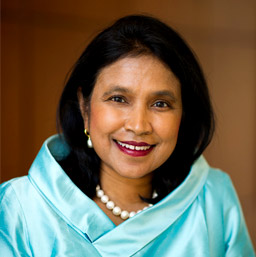Research is studying how male allyship can demystify masculinized notions of leadership & shape workplace policies that advance women’s leadership in legal
In the Fall of 2019, students in the Women, Law & Leadership course at the University of Pennsylvania Law School (Penn Law) interviewed more than 50 women leaders in law and business, exploring the concept of gender in leadership and ways in which traditional notions of leadership are undergoing radical change.
The study was designed to examine a new understanding of leadership that is defined by differences in gender, race, demographics, male allyship, and changes in the political economy, including understanding social mores as a cause-and-effect consequence of new social movements.
Rangita de Silva, the Associate Dean of International Affairs at Penn Law and the lead scholar on the project, stresses the urgency of this project and why completing it through an expanded, more integrated lens of leadership is critical. “Leadership at the highest level involves working on policies that address pressing public problems,” de Silva says.
The role of men as enabler of women’s leadership was a consistent theme during the interview responses. “What you need is allies,” explains Amy Weaver, President of Legal & Corporate Affairs and General Counsel of Salesforce. “Every group needs allies… who are going to be mentors.”
Growing out of that research — and in collaboration with the Thomson Reuters Institute — the separate project on Leadership, Diversity & Allyship was created to study how male allyship can demystify masculinized notions of leadership, shape workplace policies that advance women’s leadership, and foster gender equality in the world of work.
Students involved in the project underscored the importance of the effort to their future in the legal industry. “Allyship is critical to the development of personhood and leadership development, across a broad spectrum of communities and industries alike,” says Michael Machado, a student researcher from the project, “As future members of the legal profession, we owe special attention to the subject from the moment we enter law school.”

This research-based and data-driven model to diversify leadership from the law school classroom to public leadership, develops a first-of-its-kind leadership incubator that will allow researchers to test new approaches and advance transformative change in the law and in public life. In recent years, there has been a greater focus on the role of allies, but so far, there has been an absence of research on how an emerging generation of leaders view allyship. “Our commitment to upholding and advancing our laws, as men, is largely shaped by the manner in which we treat all women at our law school, including our empowered and courageous colleagues, the ones who speak truth to power, whom we’ll someday call coworker, friend, boss, and leader,” states Machado.
This seminal research will not only focus on the next generation of leaders in the law, and the participant pool includes 60 male law students. Through a series of in-depth interviews, the research will:
-
-
- identify young male leaders from a diverse cohort and analyze their views of allyship;
- examine male norms on allyship and ways to debias the workplace and move away from gender stereotypes; and
- highlight workplace policies and strategies that can prioritize gender equal leadership.
-
The goal through this research is to better understand how the data and information gathered can be used to produce stronger, and more equitable policies in the world of work.
The research will also include another differentiating factor — an anonymous implicit association test designed by Zahra Keshwani (adapted from the Harvard implicit bias test) to study the role of implicit biases and how those biases have restricted allyships in the past. “Our project provides a toolbox to design effective and inclusive policies on leadership, diversity and allyship,” notes de Silva.
While the current pool of interview subjects is constantly expanding, the sample currently consists of at least 50% minority men, including diversity in religion, race, LGBTQ+ representation, culture, age, and year in school. These differences, as well as current social, economic, and political forces have shaped these males’ understanding of active allyship.
Studying these factors will help us “challenge some of the prevailing assumptions about allyship,” de Silva adds.
Finally, de Silva and the research team will analyze how policies that are based on allyship can alter the shape of the human condition. “Male allyship as a topic welcomes all voices and perspectives, united in the common goal of being a better lawyer, a better friend, a better teammate, a better partner, and simply, a better person,” Machado says.







